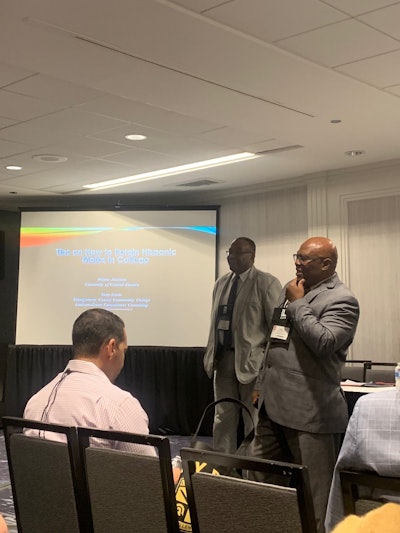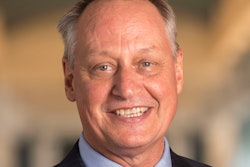CHICAGO—College administrators, faculty and students convened at the 33rd annual Hispanic Association of Colleges and Universities (HACU) conference to share best practices and strategize on how best to serve Hispanic students.
This year’s conference theme, “Championing Hispanic Higher Education Success: Meeting the Challenge of Prosperity and Equality,” included the HACU Adelante Leadership Institute which drew more than 500 college students from a wide range of academic disciplines to participate in career and leadership development activities.
The workshops held over three-days were varied, including one that focused on Latinx student research initiatives and the growing absence of Latinas in higher education leadership.
 Tony Davis and Wayne Jackson lead a discussion at HACU conference titled, “Tips on How to Retain Hispanic Males in College.”
Tony Davis and Wayne Jackson lead a discussion at HACU conference titled, “Tips on How to Retain Hispanic Males in College.”Wayne Jackson, director of Multicultural Academic and Support Services at University of Central Florida led a spirited discussion with Tony Davis, a counselor at Montgomery County Community College in Pennsylvania on how colleges and universities can do a better job at retaining their Hispanic males.
“I know why you’re here,” Jackson told a packed hotel room at the opening of the session. “You’re having all kinds of problems.”
Indeed, he was right.
The educators in the room shared that the Hispanic males at their institutions are facing a myriad of challenges, ranging from a lack of role models, to an absence of support from their families. And then, some admitted, the classroom faculty and support staff often do a lackluster job when it comes to reaching out to men of color.
“We do a great job spending money to get students there, but how much money do we spend to keep them there?” Jackson asked. “It’s all about retention, persistence and graduating students.”
He referenced Dr. Terrell L. Strayhorn’s scholarly work that focuses on college students’ sense of belonging.
“It matters that students feel cared about,” said Jackson. “It is imperative on us to do everything we can to help these students get through. If we don’t, what will happen to them? A sense of belonging is so important.”
Another workshop focused on how a group of students, faculty and staff at Metropolitan State University of Denver came together to start an initiative to help raise funds for DREAMers so that they can pay for their college education. Started in 2013, the DREAMer Network at MSU-Denver initially provide trainings for undocumented students but has since expanded its focus to help raised funds to support students in financing their college education.
There are over 500 undocumented students at MSU Denver. Thanks to a state law that passed last year, some undocumented students receive state aid. Currently, about 394 DREAMEer students at the university pay in-state tuition, making it the largest 4-year institution in the state of Colorado to serve DREAMer students.
“The DREAMer Network’s mission is to increase access, retention and graduate rates for DREAMer students,” said Samantha Borrego, coordinator of First Generation Initiatives at MSU-Denver and a volunteer with the DREAMer Network. She said this is done by raising awareness, challenging assumptions, facilitating conversations, educating the campus community, offering resources for students faculty and staff, influencing university policy to create more equity for DREAMer students and increasing funding for students.
Still, in the 2017-2018 academic school year, 64 percent of undocumented students at MSU-Denver received no financial aid. And even after the passage of HB19-11996 which allowed some students to receive state aid, those who were eligible faced a $7,600 deficit.
The DREAMer Network went to work developing promotional materials to encourage individuals to donate. They created an informational sheet to dispel myths about DREAMer students. In a little over a year, the Network has raised $114,986, including an endowed scholarship that was established by a donor earlier this year.
The funds are being used to help students supplement the cost of attending MSU-Denver and assisting them with paying the $495 DACA renewal fees so that their status is current and they’re not forced to drop out of school to earn money to pay the fee once their DACA expires.
Other educational leaders at the workshop hailed MSU-Denver’s Network as a model and said that they plan to establish similar initiatives when they return back to their campuses.
Mitzy González, assistant director of the Center for Higher Education Innovation at the University of Central Florida said that participating in her first HACU conference this weekend was different from other education conferences she’s attended in the past.
“Perhaps it is being in the same space with so many Latinx leaders who look like me? Or perhaps it is hearing the Spanish dichos I grew up listening to interwoven throughout the presentations? Or maybe it is the ability to show up in my full authentic self and know that it will be embraced?” she wondered. “Whatever it is, I’m here for it.”
Jamal Eric Watson can be reached at jwatson1@diverseeducation. You can follow him on Twitter @jamalericwatson




















